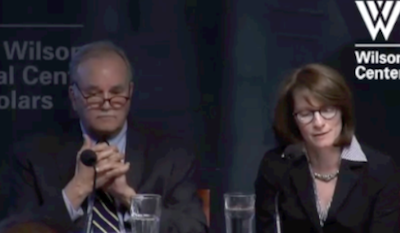BBG Watch Media
Former director of Radio Liberty during the fall of communism in the Soviet block and former presidentially-appointed member of the Broadcasting Board of Governors (BBG), S. Enders Wimbush, has published highly critical comments about Radio Farda, the Persian News Network (PNN) of the Voice of America (VOA) and the current administration of the BBG.
His comments were published by the Wall Street Journal next to the letter to the Editor from current president of Radio Free Europe / Radio Liberty (RFE/RL) Thomas Kent. Kent was responding to Sohrab Ahmari’s June 12 Wall Street Journal commentary “In Iran, Radio Liberty Doesn’t Live Up to Its Name.”
“While we will acknowledge any individual story that falls short of our editorial standards, as any news organization should,” Thomas Kent wrote, “the suggestion that Radio Farda somehow mirrors the Iranian press is ludicrous.” His full letter can be seen here.
Many observers of current U.S. international media outreach by the BBG, including S. Enders Wimbush, do not think that the criticism of Radio Farda, which is run by RFE/RL, and the Voice of America’s PNN programs to Iran is in the least unjustified or exaggerated.
S. ENDERS WIMBUSH: Mr. Ahmari is right on the mark. I was director of Radio Liberty when the Berlin Wall came down and the U.S.S.R. collapsed, arguably the most successful period in the radio’s history. Later I was a Republican member of the Broadcasting Board of Governors (2010-12), leaving that position when it became evident to me that U.S. international broadcasting was hopelessly lost, operating without a strategy and increasingly detached—indeed, often antithetically—to U.S. interests. When I was nominated to the board, several senators asked me to undertake an investigation into the Voice of America’s Persian News Network (PNN), which was widely seen as having gone off track. I presented my findings to the first meeting of the board after my confirmation by the Senate. The PNN was a complete mess: operating without serious supervision, staffed haphazardly and perhaps penetrated at different places by Iran’s intelligence services. I recommended its complete overhaul, but little happened given that most of PNN’s employees enjoyed civil-service status. I understand that little has changed today.
It’s not just the PNN or Farda, which are the tip of the iceberg. Unless U.S. international broadcasting can be completely rethought, we are probably better off closing it down and starting over. This three-quarters of a billion dollar enterprise is vital, but now it is not serving American interests. President Trump should shake up this enterprise.
S. Enders Wimbush
Washington, Va.
READ MORE: Radio Liberty Persian Service: Mixed Reviews, OPINION | LETTERS, The Wall Street Journal, June 21, 2017
ALSO READ: Reassessing U.S. International Broadcasting, S. Enders Wimbush and Elizabeth Portale, Wilson Center, 2015.
Former director of U.S. government’s WORLDNET television which operated under the United Information Agency (USIA), award winning documentary filmmaker and former Corporation for Public Broadcasting (PBS) executive Michael Pack is being considered by the Trump White House as a possible new CEO of the Broadcasting Board of Governors. He is reportedly going through the pre-nomination vetting process which is a normal procedure before any individual requiring Senate confirmation is formally nominated by the president. If nominated and confirmed, Pack would replace current BBG CEO John F. Lansing who was selected for his position during the Obama administration. Lansing, who had no prior U.S. government service, U.S. public diplomacy or foreign policy experience, was not a presidential nominee and was not confirmed by the U.S. Senate.
Image: S. Enders Wimbush and Elizabeth Portale at the Wilson Center.
